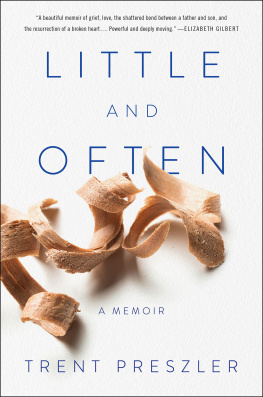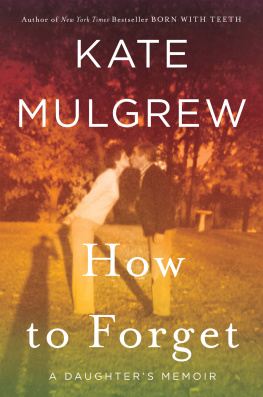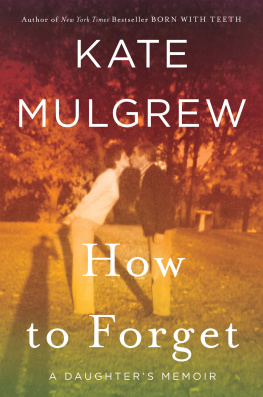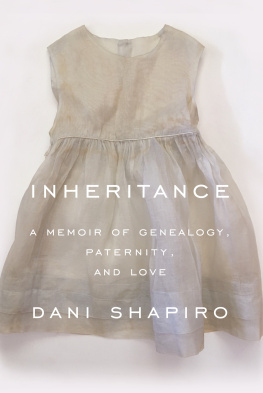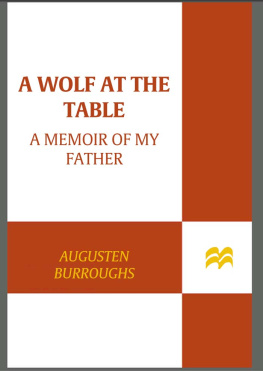In memory of Leon K. Preszler and Lucinda M. Preszler
Dedicated to Christine S. Hoover, with love and gratitude
And for my mother, who taught me something about survival
A man can be destroyed but not defeated.
Ernest Hemingway, The Old Man and the Sea
Where no sea runs, the waters of the heart
Push in their tides
Dylan Thomas, Light Breaks Where No Sun Shines
Contents
I have made my best efforts to ensure accuracy of detail and emotion in this recounting of my life. I changed the names and identifying personal details of certain people who appear in the book to preserve their anonymity. As my memory is sometimes fallible, there are places in the text where some dialogue is approximated, combined, or moved in time. Digressive conversations have been shortened. I omitted specific people and eventsintentionally, or because of compressed event timelinesbut only when those omissions had no impact on the substance of the story. There has been editing, but not at the cost of essential truthfulness.
The imposition of structure to any story, I have learned, alters realities. Scenes plucked from the fabric of life inevitably change when contemplated years after their native context. Nuances of character are sometimes lost or enhanced to the considerations of narrative. Still, this is the story of my life, created from my memories and perceptions of events, filtered through time. Others may have their own thoughts and interpretations. My greatest wish in writing this book is to help people, and I believe we are most inspiring when revealed at our most human.
First there was cedar. Then there was walnut. Then, in my house above Peconic Bay at dusk, I was ready to carve the ash. Every time I twisted my hands to ease off the cuts, curled shavings fluttered silently to the floor. The nutty scent of the wood hung in the air. A chaos of shavings piled up like snow. In that form, they were incomprehensible and unpromising. It was hard to believe something so beautiful had grown from such disarray.
Outside, a storm squall moved in from the northeast, whipping up whitecaps on the sea. Everything was gray. The last few yellow leaves clung to the scrub oaks on the beach. Had it already been a year?
I had left off the night before at the bow, where the gunwales met in a point. There was one side still to finish, and then a lot of difficult sanding after that. The top edge must gradually curl and blend into the hull, so hardwood and softwood become part of the same aerodynamic shape, the same current of energy. My eyes stayed on the top railing, and out went my right hand to land on the spokeshave. Long ago, I had memorized its placement, and my hand travelled there instinctively. Despite my struggles with them early on, by now the tools had become familiar through repetition. They revealed themselves to me by their weight and balance, by the texture of their cold metal surfaces, by the feel of their soft, worn handles.
I leaned against the hull; its thin planking pressed hard on my hip. Now the stroke, long and with the grain, walking the length of the boat as the blade zipped through the trees growth rings, its cambium, sapwood, heartwood, and pith. The cut was crisp, with little resistance, like the feel and sound when you turn the crank of a pencil sharpener. The gunwales were milled from a rare beetle-free log of American white ash, and the tree must have been old when it fell to the loggers saw. Well, old for a person, young for a tree.
My whole body propelled the tool, reaching forward and pulling back. Each stroke of the spokeshave required a slightly new way to grip it, a slightly different arm and shoulder position, a little compensation left or right with my torso. It was a pleasing twist, like kayaking, each stroke different from all the others before it, and each shaving a unique imprint of the blade. To travel that long distance between rough and smooth, I had to trust the process: remove a little bit here, a little more there, until all the little cuts added up to something bigger.
Ducks passed by on their southern migration. Water ripped through the channel on its path to the sea. The clouds darkened as the squall closed in. It didnt matter; there was nowhere else I would rather be.
I moved deeper into the carving, working silently, no words or thoughts to distract me. It felt timeless. A trancelike hum bled away whatever anxieties I still harbored. My ears tuned in to the music of sharpened steel slicing through wood, and the wood was saying things to methings I had only recently begun to understand.
Chapter 1
The Phone Call
Hello, Trent?
The two words froze me. During the fourteen years my father and I were estranged, he called only when he had devastating news to share. His voice transported me to the last time I had answered a phone and heard him say my name. I thought of that day, and of what he had said next. I hoped he was calling for a different reason this time.
Mom told me you was livin on the ocean now, he said.
I kept up with family news through a back channel: Mom. We would chat on her desk line at the University of South Dakota, where she worked as a support specialist. It had not occurred to me that she was telling my father everything I had told her over the years.
Yes, I moved into a beach house.
A divorce earlier that year, in 2014, had left me homeless at age thirty-seven. I was living out of a suitcase in a hotel room when I read an ad in the local paper for a 1920s beach bungalow. I liked it so much that I signed a lease on the spot. My new house looked across a bay toward Robins Island, a rocky outcropping that was deposited as glacial outwash eleven thousand years ago. The channel between my house and the island was deep, and during the changing of the tides, it filled with clear seawater that flowed swiftly past Marratooka Point. The house was perched on a bluff eighty miles east of New York City in a landscape that I had come to lovea place where Long Islands suburban strip malls gave way to bleached sand dunes. It was a land of pitch pine and scrub oak barrens, manicured vineyards, polo matches, and roadside farm stands selling heirloom vegetables to weekenders from the city. In summer, there was constant traffic on Main Road and private jets roaring to the Hamptons. The culture and geography of this place revolved around the Peconic Estuary system: more than a hundred distinct bays, harbors, and creeks that ebbed and flowed in a relentless churn, mixing the waters of Long Island Sound with the Atlantic Ocean. Nothing on the beach was ever the same from one day or even one hour to the next. Some days the bay in front of my house was wild and violent, with thrashing four-foot waves. Other days, the water was flat and calm like an alpine lake, a study of infinite shades of blue.
Thats awful big water out there, my father said. You got a boat?
He spoke in a firm kind of cowboy poetry, made of actions and things. This time, his unexpectedly weak and gravelly voice distracted me from the substance of his question. At some point, the strong voice I once knew as my fathers must have turned into this old mans voice I heard on the phone. I did not know when the change happened. Perhaps there was no single moment.
No boatdont have time, I said.
Hows work?
What? I was so surprised to be asked anything about my personal life that I became confused, as if I had been reading something and lost my place on the page. Oh, work is... fine.
After a decade cutting my teeth in the wine business, I had recently been promoted to CEO of a vineyard on the North Fork of Long Island. My new title was not a respite, just more pressure. I had not taken a day off in months and every minute was booked with board meetings, wine tastings, charity galas, and lavish client dinners at restaurants that were almost impossible to get into. On top of that, I received daily reminders from the owner that the winery had better turn a profit soon, or else my stint as CEO would be short. The workload was brutal, but mine, and better than sitting in a high-rise cubicle. The day my father called I was making final preparations to unveil our new wine label at a launch party in Manhattan the week before Thanksgiving.

